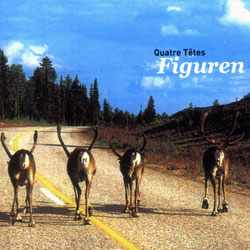
An all-female Swiss quartet, basically the fusion of two duos. Pianist Gabriela Friedli and trombonist Priska Walss (here doubling on alphorn) are known as Duo Frappant, a CD already released on Intakt titled Intervista. A second pianist, Claudia Ulla Binder, was a regular performing companion of flutist Susann Wehrli, in this occasion also featured on melodica. The separate entities took the shape of Quatre Têtes five years ago, after having met at "Zürcher Stadtsommer 2004". As a symbolic memento of past times, three of the pieces in this program are duets.
That these women are technically well-trained becomes evident from the very first cut "Beauty's Biest", a cross of amusing improvisation and chamber music which meshes somber chordal work and quiescent coals of whimsical, if digestible anti-patterns. Another episode, "Lavtina", examines the connections between a somewhat disenchanted predisposition to leaving lots of spaces for the ideas to flow and contrapuntal environments that might recall early theatre backgrounds. An acceleration of sorts is found in "Läufer und Turm", Walss' trombone spreading astute lines amidst a not overly dissonant harmonic tissue, while in "Penelope" the alphorn is tackled by rendering it akin to a didgeridoo against Wehrli's quasi-accordion melodica shades, causing yours truly to fantasize about a transverse If, Bwana/Guy Klucevsek liaison before aptly bowed piano strings conclude the whole with remarkable authority and a required touch of mystery.
Someone could be turned off by the instrumental cluttering characterizing certain parts of the record, or decide that this kind of impromptu decision-making hides in actual fact a lack of revolutionary spark. This is in part true — we couldn't really say that everything sounds unexpected. Yet even during the most skeletal exchanges, such as the Wehrli/Friedli dialogue in "Voyageurs", the rewards come from a pair of factors: the absolute transparency of the timbres and the rather candid approach to unearthing instant solutions, both qualities manifested in every juncture by the musicians. This is a much appreciated attitude revealing seriousness — not necessarily a given in today's scene.
Maybe the secret lies exactly there: this stuff does not sound like "avant-garde". Figuren appears more as an ongoing process involving four artistic voices who are still attempting to reach a superior level of consistency as a collective unit, but whose straight genuineness is a pleasant diversion from the annoyingly sanctimonious rigor shown by many weightier names in this field.
Comments and Feedback:
|



